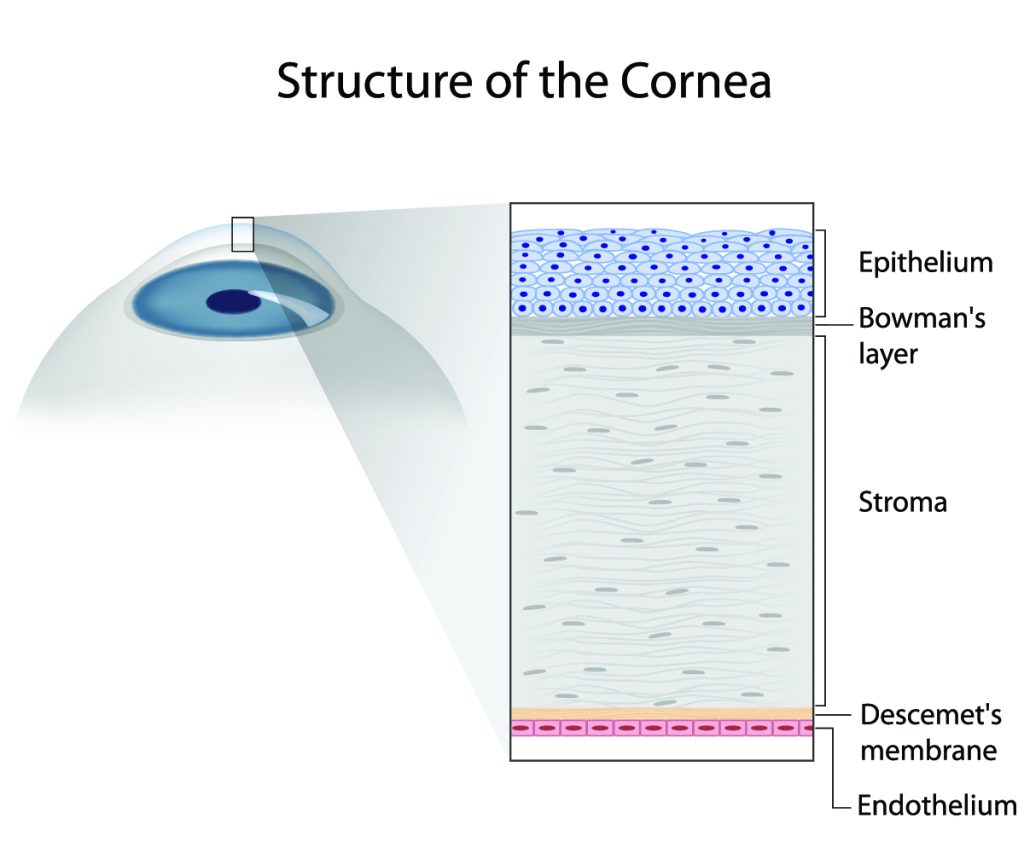The cornea is the eye’s outer layer and acts as a clear window. Corneal diseases and conditions that affect the health of the cornea may cause vision loss or impairment. While the cornea can repair itself after some trauma or illness, severe disorders, deterioration or infection require prompt treatment to prevent permanent vision damage.
Corneal conditions often come with blurred vision, redness, tearing, light sensitivity, pain and corneal scarring. Make an appointment with our cornea specialist at Kornmehl Laser Eye Associates in Boston if you experience those symptoms or signs of the conditions listed below. Dr. Earnest W. Kornmehl is a world-renowned ophthalmologist who can diagnose and treat your corneal concerns.
1. Keratitis
Keratitis is infectious. Microorganisms penetrate the affected eye, causing corneal ulcers and infectious keratitis. Keratitis may occur as a result of improper contact lens wear and often comes with reduced visual clarity, severe eye pain, light sensitivity and corneal discharge.
2. Shingles (Herpes Zoster)
People who have had the chickenpox virus may develop shingles later in life. The virus typically stays inactive in the body’s nerves but can reoccur and travel into other areas of the body, such as the eye. Herpes zoster causes fever, pain in the affected nerve fibers and corneal blisters or lesions.
3. Ocular Herpes
Ocular herpes is a viral eye infection that tends to reoccur and is typically caused by the same virus that leads to cold sores (herpes simplex virus I). However, it may also be caused by the sexually transmitted form: herpes simplex virus II, also called genital herpes. Ocular herpes may affect vision and cause sores and scarring on the corneal surface.
4. Keratoconus
Keratoconus is a type of corneal degeneration. This progressive eye disease causes the cornea to thin and change shape, forming a cone shape that leads to visual distortions, such as nearsightedness and astigmatism that worsens. Keratoconus may cause swelling, cornea scarring and vision loss. Dr. Kornmehl offers corneal collagen cross-linking for keratoconus patients to restore vision and prevent disease progression. Some patients may require a corneal transplant.
5. Fuch’s Dystrophy
Fuch’s dystrophy causes the slow deterioration of the endothelium (the cornea’s innermost layer). This layer is supposed to act like a fluid pump, removing excess water from the cornea for clear vision. When these cells are weakened, patients experience blurry vision that progresses to small blisters on the corneal surface and hazy eyesight. Fuch’s dystrophy may cause blurred vision in the morning that improves as the day goes on, but as the disease worsens, this blurriness becomes more constant.
6. Map-Dot-Fingerprint Dystrophy
Map-dot-fingerprint dystrophy is a corneal condition that forms abnormal folds and reduplications of the epithelium tissue (outermost corneal layer). These alterations look like dots, maps or tiny fingerprints and are typically painless. This type of dystrophy may cause vision loss, and some patients experience corneal abrasions that expose the nerves lining the cornea or epithelial erosion, causing severe pain, astigmatism and nearsightedness. Map-dot-fingerprint dystrophy tends to cause excessive tearing, light sensitivity, moderate to severe pain and a sensation that something is in the eye (often upon awakening).
If you’re experiencing signs of corneal disease, call Kornmehl Laser Eye Associates as soon as possible. Contact Dr. Kornmehl in Boston, Massachusetts, at (877) 870-2010.
